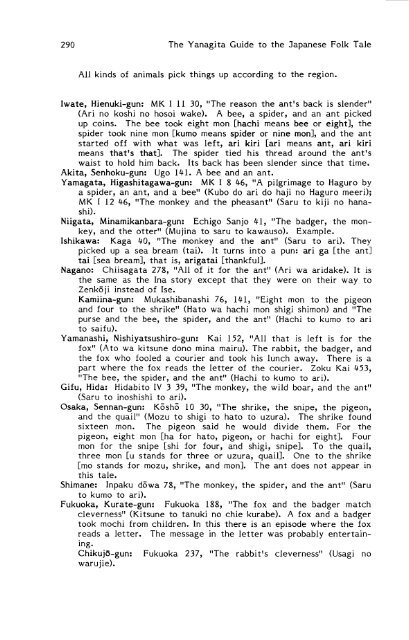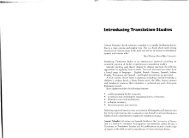Japanese Folk Tale
Japanese Folk Tale
Japanese Folk Tale
You also want an ePaper? Increase the reach of your titles
YUMPU automatically turns print PDFs into web optimized ePapers that Google loves.
290 The Yanagita Guide to the <strong>Japanese</strong> <strong>Folk</strong> <strong>Tale</strong><br />
All kinds of animals pick things up according to the region.<br />
Iwate, Hienuki-gun: MK I 11 30, "The reason the ant's back is slender"<br />
(Ari no koshi no hosoi wake). A bee, a spider, and an ant picked<br />
up coins. The bee took eight mon [hachi means bee or eight], the<br />
spider took nine mon [kumo means spider or nine mon], and the ant<br />
started off with what was left, ari kiri [ari means ant, ari kiri<br />
means that's that]. The spider tied his thread around the ant's<br />
waist to hold him back. Its back has been slender since that time.<br />
Akita, Senhoku-gun: Ugo 141. A bee and an ant.<br />
Yamagata, Higashitagawa-gun: MK I 8 46, "A pilgrimage to Haguro by<br />
a spider, an ant, and a bee" (Kubo do ari do haji no Haguro meeri);<br />
MK I 12 46, "The monkey and the pheasant" (Saru to kiji no hanashi).<br />
Niigata, Minamikanbara-gun: Echigo Sanjo 41, "The badger, the monkey,<br />
and the otter" (Mujina to saru to kawauso). Example.<br />
Ishikawa: Kaga 40, "The monkey and the ant" (Saru to ari). They<br />
picked up a sea bream (tai). It turns into a pun: ari ga [the ant]<br />
tai [sea bream], that is, arigatai [thankful].<br />
Nagano: Chiisagata 278, "All of it for the ant" (Ari wa aridake). It is<br />
the same as the Ina story except that they were on their way to<br />
Zenk6 ji instead of Ise.<br />
Kamiina-gun: Mukashibanashi 76, 141, "Eight mon to the pigeon<br />
and four to the shrike" (Hato wa hachi mon shigi shimon) and "The<br />
purse and the bee, the spider, and the ant" (Hachi to kumo to ari<br />
to saifu).<br />
Yamanashi, Nishiyatsushiro-gun: Kai 152, "All that is left is for the<br />
fox" (A to wa ki tsune dono mina mairu). The rabbit, the badger, and<br />
the fox who fooled a courier and took his lunch away. There is a<br />
part where the fox reads the letter of the courier. Zoku Kai 453,<br />
"The bee, the spider, and the ant" (Hachi to kumo to ari).<br />
Gifu, Hida: Hidabito IV 3 39, "The monkey, the wild boar, and the ant"<br />
(Saru to inoshishi to ari).<br />
Osaka, Sen nan-gun: Kosho 10 30, "The shrike, the snipe, the pigeon,<br />
and the quail" (Mozu to shigi to hato to uzura). The shrike found<br />
sixteen mono The pigeon said he would divide them. For the<br />
pigeon, eight mon [ha for hato, pigeon, or hachi for eight]. Four<br />
mon for the snipe [shi for four, and shigi, snipe]. To the quail,<br />
three mon [u stands for three or uzura, quail]. One to the shrike<br />
[mo stands for mozu, shrike, and mon]. The ant does not appear in<br />
this tale.<br />
Shimane: Inpaku dowa 78, "The monkey, the spider, and the ant" (Saru<br />
to kumo to ari).<br />
Fukuoka, Kurate-gun: Fukuoka 188, "The fox and the badger match<br />
cleverness" (Ki tsune to tanuki no chie kurabe). A fox and a badger<br />
took mochi from children. In this there is an episode where the fox<br />
reads a letter. The message in the letter was probably entertaining.<br />
Chikujo-gun: Fukuoka 237, "The rabbit's cleverness" (Usagi no<br />
warujie).







